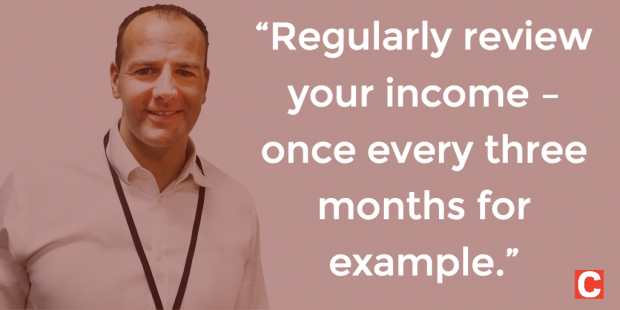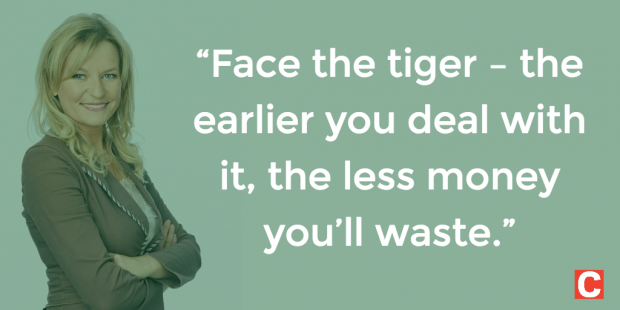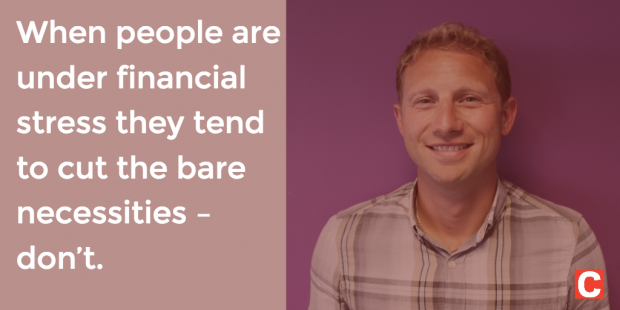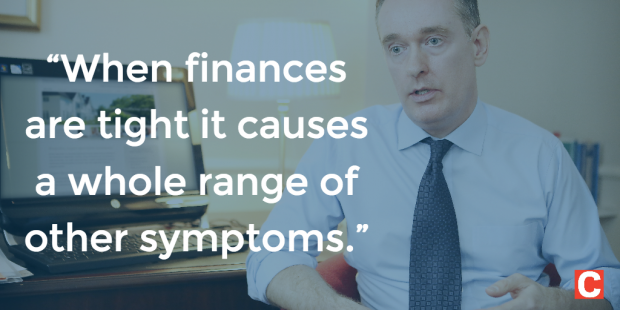
One of the biggest external influences on your health, happiness and wellbeing is money. So Coach has rounded up some experts to provide practical advice on how to identify and cut down on unnecessary expenditures, earn a bit of money on the side, deal with the anxiety money brings and, if you get into deep trouble, where you can turn to for help. But first, money and anxiety experts Andy Webb and Dr Ian Drever talk about the five stages of money worries. Where are you on this scale?
The Five Stages of Morning Worries
Stage 1 Slight day-to-day difficulties managing money; the occasional anxiety about it (very mild psychological distress). You’re not in debt but sometimes you’re broke at the end of the month – then, come payday, you’re back on top.
Stage 2 Some debts which are creeping up a little – credit cards, mostly – though manageable. Just a couple of unforeseen emergencies, though (broken washing machine, having to move house etc) and you could be in trouble.
Stage 3 You’re in a debt spiral, building debt on debt [missed credit card repayments are costing you fees, for example, as well as a bank loan]. The worry is building now – you’re starting to avoid checking your bank balance.
Stage 4 This is dire. You’re borrowing money to pay for bills and food; either from friends, a credit card or high-interest emergency loans. You live in your overdraft, can barely make the rent and are losing both sleep and weight.
Stage 5 Bailiffs? Bankruptcy? Jail? These are some issues you’re facing – with major repercussions for your future. You can’t function and need help, not just from a financial expert but also a doctor and a lawyer.
Sign up for workout ideas, training advice, reviews of the latest gear and more.
How to Cope with Money Problems
Dealing with Mortgages

John Foster has worked in debt management at NatWest for 14 years
My job is to look after people’s mortgages – essentially the roof above their heads – and, therefore, I see a serious amount of worry in people when things go wrong.
When shopping around for a mortgage remember that you don’t have to borrow the maximum amount of money: large mortgages can be a source of great anxiety.
It can be very scary when mortgage or rent payments become an issue, because essentially it’s about the roof above your head. Many customers have the impression that those in financial difficulty will be chased by banks and organisations for money, but in fact we are compelled – by regulations as well as desire – to understand the situation and work with the customer to come up with an appropriate solution, so it is best to contact us straight away and let us help. One of the first things we recommend is that those in trouble contact free independent money advice charities such as StepChange and the Citizens Advice Bureau.
These charities can highlight benefits that aren’t being taken up or contact creditors on a customer’s behalf. The other thing I tell people is to regularly review your income – once every three months for example – and be aware of where they might be needlessly spending money.
Practical Steps to Take if You’re Struggling With Money

Andy Webb works at the free and impartial Money Advice Service
If you’re struggling with money the first thing to do is to get a handle on what you’re actually spending and what money you have coming in.
Doing a ‘life audit’ can be helpful – do you really need all these things you spend money on? Do you succumb to peer pressure and go out for work drinks every Friday, spending £50? What about your mobile phone? Do you really need unlimited data? If you have a gym membership you rarely use, think about alternative ways of getting fit, such as incorporating it into your commute (thus saving a bit on transport, too). It’s often easy to make quick household savings without much deprivation. These include temporarily stopping cable or satellite television contracts and switching energy supplier. People think the latter will take ages but, if you have your bills in front of you, it’s not more than half an hour and you can save £300 per year. If you have a mortgage you can look for a better deal – don’t go straight on to the standard variable rate, as right now there are some very low mortgages available (although there can be fees associated with moving providers).
Take advantage of season ticket loan schemes run by employers, which allow you to buy yearly tickets and pay them off monthly – this can save you hundreds annually. Parents often can’t avoid childcare fees during holidays, but it is at least possible to find free activities if you do your research. Also, organise your Christmas: people also often feel pressured to spend a lot at this time, but if you plan ahead and work out what you can afford first and then stick to the budget, it can save a lot of headaches when the credit card bills arrive in January.
The Money Advice Service has a free online budget planner and offers free independent debt advice via our website, which connects you with someone to meet with or speak to over the phone to about your money problems, helping you to prioritise and cope with debts.

Jasmine Birtles is a finance expert and business commentator
If you’re spending a lot of time worrying about money, why not devote this time into little side-earners?
There are lots of things you can do, including dog-walking for £15 per dog per hour. Or there’s babysitting, car-boot sales, fixing things and renting your house out on Airbnb. When it’s the beginnings of anxiety – ie, there’s too much month for your money – start by using an online budget tool or ask a sensible friend to sit with you while you go through your bills and statements and set out an action plan. It’s often not as bad as you imagine. Face the tiger – the earlier you deal with it, the less money you’ll waste and the easier it’ll be to deal with creditors.
Take out the money you have for the week in cash at the start of the week and only use that. Try establishing an ‘emergency fund’ for sickness, job loss or bereavement, ideally building up six months’ worth of money. One way to do this is to pay an amount via standing order into a savings account to yourself at the start of the month. If you do get to crisis point, and end up not answering the door or opening the post because you’re worried about the bailiffs, it’s time to ask for professional help from free charities such as Christians Against Poverty or StepChange.

James Mayer is Head of Finance at event planners The Stag Company
When people are under financial stress they tend to cut budgets from the bare necessities. This can include spending much less on food – however, not having the proper nutrients to combat stress hormones can leave you in a worse position. Tackling life is even harder when hungry. Instead, to ease your anxiety, draw up a journal of everything you spend during a week. You’ll be surprised where the money leaks from. Stop ordering food in at £25, when you can buy almost your entire weekly shop for that!
If you learn to cook, you can prepare food the night before. Use voucher websites to save money where possible, from Hot UK Deals to Vouchercodes. Whatever you do, don’t go for high-interest emergency loans (get free professional advice instead). And don’t lend people money.”
Dealing With Anxiety About Money

Nick Peters is a psychotherapist working in south-west London
Of course those who can’t make ends meet have to take care of things practically, such as seeking professional help with debt and expenditure, but often it’s not so much about the money as what it represents.
There are others who may be very comfortably off but are neurotic and anxious about money because of what it represents. For example, money might relate to status: people think they’ve got money problems, but really what they’re worried about is not being able to go on the same flash holiday as their friends. This often means that money anxieties are really about a fragile ego and unconscious insecurities. Anxiety can also get projected onto one’s bank balance; many look for in money what they really seek in others: love, attachment and connection.
Money can make us feel powerful and in control – thus it can become a way of countering vulnerability. When my clients are worrying about their bonus or a better-paid job, what they are really worrying about is feeling vulnerable. That’s why, for those who aren’t in dire straits with money but are worrying about it, I’d recommend seeking some therapy. What I often see is that once people begin to develop stronger, more intimate nurturing relationships with others where they can be their real selves, their money anxieties reduce.

Ian Drever is a psychiatrist at The Priory Hospital, Guildford
At The Priory we see a lot of high-functioning individuals with money worries interlinked with career and identity issues, which makes money issues even more troublesome.
When finances are tight it causes a whole range of other symptoms, which act like warning lights – as on a car dashboard – to tell us that we’re under psychological stress. These include sleep issues (struggling to get to sleep or waking very early), a change in appetite, reduction in energy, focus and ability to socialise, as well as becoming more irritable and losing interest in hobbies and pastimes. These may seem innocuous but it’s important to be aware of these early signs. Your body is telling you something is up.
Often money problems build quite insidiously and people soldier on, carrying more and more financial and related anxieties before a final small thing causes a breakdown of sorts. Periods of chronic and continued stress can lead to an anxiety disorder such as generalised anxiety disorder (characterised by free-floating anxiety about lots of things).
People should be reassured, however, that anxiety is a treatable medical condition in the same way that high blood pressure or asthma is. Treatment can include medication, which for most people is just 20% to 30% of the answer, and talking therapy – particularly with a clinical psychologist who specialises in anxiety and can understand and help to change the thought processes underpinning the anxiety.
